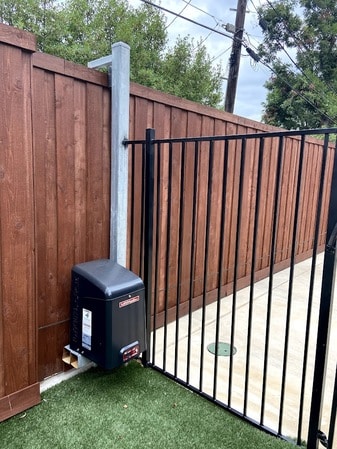Privacy fencing plays an essential role in enhancing the security, aesthetics, and privacy of a property. Whether you’re trying to block out nosy neighbors, protect your backyard oasis, or add a touch of style, selecting the right material for your privacy fence is crucial. With a wide variety of options available, it can be overwhelming to determine which material best suits your needs.
In this post, we’ll walk you through the benefits and key considerations of wood, vinyl, and other popular materials for privacy fence installation, helping you make an informed decision that enhances your home’s privacy and curb appeal.

Categories
Understanding Privacy Fence Installation
How Privacy Fence Installation Works
Privacy fence installation involves several key steps, regardless of the material you choose. Here’s an overview of the typical process:
- Planning and Design: Determine the fence location, measure the area, and check for local building codes.
- Choosing the Right Material: Decide between wood, vinyl, or other materials based on your needs and preferences.
- Post Installation: Install fence posts securely into the ground using concrete or other methods for stability.
- Panel Installation: Attach panels or slats to the posts to form the fence, varying by material.
- Finishing Touches: Apply necessary finishes like staining, painting, or protective coatings for durability.
Comparing Wood, Vinyl, and Other Materials for Privacy Fencing
Benefits of Wood Privacy Fencing
Wood is a classic choice for privacy fences, offering a natural look and versatility. It provides aesthetic appeal, customizable designs (cedar, pine, redwood), and is cost-effective compared to other materials. Additionally, wood fences are easy to repair by replacing damaged boards. However, they require regular maintenance to prevent issues like rotting and insect damage, especially in humid climates.
Advantages of Vinyl Privacy Fencing
Vinyl fences are low-maintenance and highly durable. They don’t require sanding, painting, or staining and can withstand harsh weather conditions. Vinyl fences offer a long lifespan, lasting for decades with minimal care. They are available in a variety of styles and colors and can mimic wood without the maintenance drawbacks. However, vinyl tends to be more expensive upfront than wood, which may influence your decision depending on your budget.
Other Privacy Fence Materials
While wood and vinyl are two of the most popular options, there are other materials you can consider for your privacy fence installation:
- Aluminum Fencing: Though not as commonly used for privacy fences, aluminum can be a good option if you want a durable, lightweight fence with a modern appearance. It’s low-maintenance but doesn’t offer as much privacy as wood or vinyl.
- Chain-Link with Privacy Slats: If security is a priority, chain-link fences with privacy slats can be an option. This offers the advantage of a strong, secure fence but may not be as aesthetically pleasing as wood or vinyl.
- Composite Fencing: Made from a combination of wood fibers and plastic, composite fencing offers the look of wood with the durability of vinyl. It’s a more expensive option but requires less maintenance than wood.
Important Factors to Consider When Choosing the Right Fence Material
When choosing a material for your privacy fence, consider these factors:
- Budget: Your budget will likely be one of the most significant factors in your decision. While wood tends to be more affordable upfront, vinyl and composite fences offer greater long-term durability, which could justify the higher initial investment.
- Climate: If you live in a humid or rainy climate, vinyl or composite may be a better option, as wood fences can suffer from rot and mold.
- Aesthetic Preferences: Wood offers a timeless, natural look, while vinyl and composite options provide a more modern and uniform appearance.
- Maintenance: If you want a low-maintenance option, vinyl or composite fencing is ideal. Wood requires regular upkeep to maintain its appearance and prevent damage.
- Durability: Vinyl and composite fences are highly durable and weather-resistant, while wood may need more frequent repairs and replacements.
Common Misconceptions About Privacy Fencing
Myth 1: Wood Fences Are Always Cheaper
While wood may seem like the cheapest option initially, the maintenance costs associated with wood fences can add up over time. Vinyl and composite fences might have a higher upfront cost but save you money in the long run due to their low maintenance.
Myth 2: Vinyl Fences Are Fragile
Many people believe vinyl fences are fragile and prone to damage, but modern vinyl fences are quite durable and can withstand extreme weather conditions. They are also resistant to cracking and fading, unlike some wood options.
Contact Us Today
Choosing the right material for your privacy fence installation is a crucial decision that can impact the appearance, security, and maintenance of your property for years to come. Whether you opt for the natural charm of wood, the durability of vinyl, or another material, it’s important to consider all your options carefully.
If you’re ready to invest in a privacy fence that suits your needs and budget, Double Eagle Fence is here to help. Contact us at (214) 53-9444 to discuss your privacy fence installation options and get a free estimate.
Frequently Asked Questions
How long does a privacy fence last?
A wood privacy fence typically lasts 10-15 years with proper maintenance, while vinyl fences can last 25 years or more, depending on the quality of the material and the climate.
Do I need to stain or paint my wood privacy fence?
Yes, to maintain the appearance and longevity of your wood fence, it’s recommended to stain or paint it regularly to protect it from the elements.




